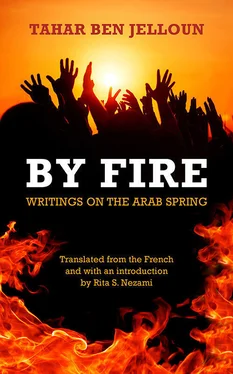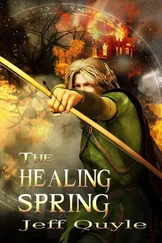I have strived to preserve Ben Jelloun’s tone and diction, his compassion for the protagonist, and his representation of Mohamed’s toxic environment. Priorities in my translation were faithfulness to the text’s lexical choices, Ben Jelloun’s aesthetic, and his voice, which is unique among Arab writers. I have sought to preserve the essence of idiomatic expressions. Above all, by respecting its cultural sensibilities, I have resisted domesticating the text, as an American Englishing will not tolerate Ben Jelloun’s voice. In Par le feu , there appears several times the word flic , whose translation is “cop”; I chose “police” or “police officer,” and used the word cop only in dialogue. I left all cultural elements and sensibilities intact as readers depend on them for access to Ben Jelloun’s streets full of vendors fleeing security agents, parrot men, sellers of pirated DVDs and loose American cigarettes, acrobats performing tricks, monkey trainers, storytellers, drivers who stop to buy fruit through the car window, and town halls where front-desk clerks repel people like Mohamed.
. .
Translators have an especially important task when they undertake texts from acutely inflamed areas of the world. Literary texts and their translations can open for readers the work of writers who bring news from a space unseen and unseeable by television cameras and officials’ sound bites. The Arab Spring is perhaps history, yet conditions throughout the Middle East continuously plunge into overwhelming humanitarian crises. Human rights abuses run rampant as beheadings and legions of starving, exploited refugees dominate news from the region. The chaos of war and the continuously shifting allegiances of sects, clans, and rebels birth rumors and confusion. There are stories of illegal emigrants making treacherous journeys to find employment, and there are stories of many young Tunisians and European Muslims joining the so-called Islamic State.
Then there are the Mohamed Bouazizis embedded in this mélange of violence and irrationality. They do not want to fight. They want to feed their families and live in peace and dignity. Ben Jelloun tells the story of one such man whom his government failed. Then the sky fell in. Hopes soared for a new era with the Arab Spring, and they collapsed. Now, more than ever, continuous war appears to be the new normal. Beneath the smoke and the rubble, the collapsed homes and desperate refugees, there are real people — individuals, not groups. Redeeming the individual sufferer amid the masses that the West sees on its iPhones and iPads is Ben Jelloun’s moral imperative. Neither the historical Mohamed Bouazizi nor his double are Everyman. Rather than generalize, though, Ben Jelloun, through the double he creates as an act of literature , reveals Mohamed Bouazizi in all his specificity.
Translation is an art. It requires creativity. Above all, it offers understanding of the global perspective. Translating By Fire and The Spark was not a process of replacing one word with another. It meant capturing the essence of the texts. The translation process and recreation of the texts fostered in me a sense of empathy like I never experienced before. It offered me a deeper understanding of how people like Mohamed might feel. I translate Tahar Ben Jelloun’s stories because they help me understand the human condition. I translate his work because he confronts and denounces dictatorship, corruption, exploitation, violence, and female repression. Like the author himself who speaks for all those who cannot speak, I want to translate the silence of all those who hope and wait for someone to tell the world of their suffering. Ben Jelloun’s achievement is to peel back the West’s layers of culture, fear, suspicion, distance, and apathy, and allow us to see — to really see, in a way that only art enables — one specific son, brother, and lover in his humiliation, desperation, and death.
Beaumont, Peter. 2011. “Mohammed Bouazizi: The Dutiful Son Whose Death Changed Tunisia’s Fate.” Guardian (London), January 20. Accessed November 19, 2014.
Ben Jelloun, Tahar. 2011. L’étincelle . Paris: Gallimard.
——. 2011. Par le feu: Récit . Paris: Gallimard.
——. 2013. “By Fire.” Translated by Rita S. Nezami. New Yorker , September 16.
Chan, Sewell. 2015. “Nobel Peace Prize Is Awarded to National Dialogue Quartet in Tunisia.” New York Times , October 9. Accessed December 9, 2015.
DeLillo, Don. 1993. “The Art of Fiction.” Interview by Adam Begley. Paris Review , Summer. Accessed November 2, 2014.
Kundera, Milan, and Michael Henry Heim. 1981. The Book of Laughter and Forgetting . Translated by Michael Heim. New York: Penguin.
Le Clézio, J. M. G. 2000. “Tahar the Wise.” Banipal: Magazine of Modern Arab Literature 8 (Summer): 3–5.
“Memories of a Tunisian Martyr.” 2011. BBC News, January 22. Accessed October 27, 2014.
“Q&A: Tunisia Crisis.” 2011. BBC News , January 19. Accessed November 30, 2014.
“Religious Views on Suicide.” N.d. Muslim Public Affairs Council . MPAC Foundation. Accessed November 18, 2014.
Ryan, Yasmine. 2014. “How One Country Emerged from the Arab Spring with a Democratic State.” Nation , March 3. Accessed November 16, 2014.
Sanders, Katherine. 2011. “Translating the Invisible with Tahar Ben Jelloun.” Words without Borders , September 27. Accessed October 30, 2014.
Simon, Bob. 2011. “How a Slap Sparked Tunisia’s Revolution.” CBS Interactive , February 22. Accessed October 27, 2014.
Thomas, Anne. 2011. “Authors at Berlin Festival Talk about ‘Writing the Arab Spring.’ ” Deutsche Welle , September 13. Accessed November 26, 2014.
Treisman, Deborah. 2013. “This Week in Fiction: Tahar Ben Jelloun.” New Yorker , September 6. Accessed October 30, 2014.
“Tunisia Country Profile.” 2007. Carter Center , August. Accessed December 8, 2015.
“Tunisia: Neighbor’s Duty.” 1957. Time , December 2, 1–2. Accessed November 27, 2014.
“Tunisia: No Time for Democracy.” 1958. Time , September 29, 2. Accessed November 27, 2014.
“Tunisia Revolt: Mohamed Bouazizi Police Suspect Freed.” 2011. BBC News , April 20.
“Tunisia’s Remarkable Achievement.” 2014. New York Times , January 28. Accessed December 8, 2015.
Waltz, Susan Eileen. 1995. Human Rights and Reform: Changing the Face of North African Politics . Berkeley: University of California Press.
The Spark Tunisia December 2010–January 2011
The Tunisian national anthem by poet Aboul Qacem Echebbi ends with these four lines:
When the people will to live,
Destiny must surely respond.
Oppression shall then vanish.
Fetters are certain to break.
The demonstrators sang this verse, as had their grandparents, during the fight for independence in 1956.
Ben Ali’s regime could be compared to a colonial occupation; that is to say, illegitimate and cruel. He spent more than twenty years assembling networks and structures that rendered the country at his mercy. Using the pretext of protecting the country from the Islamist peril, he allowed himself anything that pleased him, all under the watchful and encouraging eyes of European nations.
Revolutions and resistance often inspire a surge of creativity in poets. After Tunisia embraced new ways of living and working, Egypt followed with a revolt that subverted the idea that the Arab region is cursed and doomed to dictatorship and regression. Some writers devoted their lives to denouncing this curse. Always visionaries, poets foresee what absolutely must change. Dictators would do well to read the poets, whom, in general, they hate. A day always arrives when people’s resistance itself becomes a kind of poem. We saw it in the streets of Tunisia and then in Egypt.
Читать дальше











![Anne Blunt - A Pilgrimage to Nejd, the Cradle of the Arab Race. Vol. 1 [of 2]](/books/749489/anne-blunt-a-pilgrimage-to-nejd-the-cradle-of-the-thumb.webp)
![Anne Blunt - A Pilgrimage to Nejd, the Cradle of the Arab Race. Vol. 2 [of 2]](/books/750183/anne-blunt-a-pilgrimage-to-nejd-the-cradle-of-the-thumb.webp)